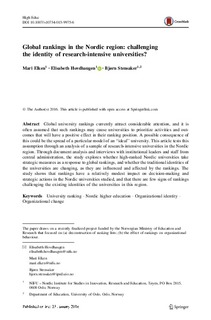| dc.description.abstract | Global university rankings currently attract considerable attention, and it is often assumed that such rankings may cause universities to prioritize activities and outcomes that will have a positive effect in their ranking position. A possible consequence of this could be the spread of a particular model of an ‘‘ideal’’ university. This article tests this assumption through an analysis of a sample of research-intensive universities in the Nordic region. Through document analysis and interviews with institutional leaders and staff from central administration, the study explores whether high-ranked Nordic universities take strategic measures as a response to global rankings, and whether the traditional identities of the universities are changing, as they are influenced and affected by the rankings. The study shows that rankings have a relatively modest impact on decision-making and strategic actions in the Nordic universities studied, and that there are few signs of rankings challenging the existing identities of the universities in this region. | |
